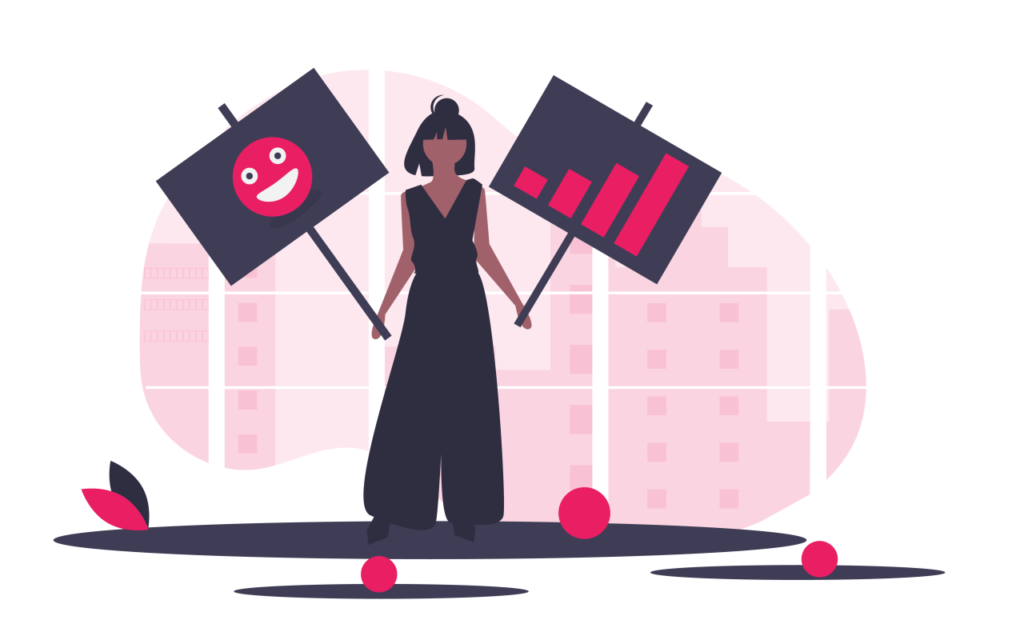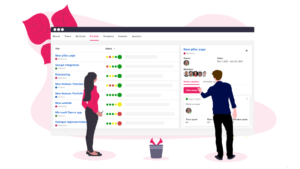According to Shawn Achor, author of “The happiness advantage”, a company with happy employees can increase their productivity by 31 % and sales by 37 %. In addition, happiness at work builds positivity, reduces stress, increases innovation, and improves quality of life. It’s a win-win situation, where your happiness benefit both yourself and the company you work for. Let’s go through seven ways that you can increase your happiness (and productivity) at work.
1. De-clutter your workspace

«The ability to simplify means to eliminate the unnecessary so that the necessary may speak.» – Hans Hofmann
Why?
The environment around us can have a big impact on how we feel, which again can affect our performance at work. When our workspace is a mess, it’s hard to focus. Clutter is simply delayed decisions. It can induce stress and anxiousness, which again affects our productivity.
Simplicity and de-cluttering however, brings peace and tranquility to the mind. Less clutter means less distraction and allows you to focus on the task at hand.
How?
1. Identify the necessities.
What do you absolutely need to get your work done?
2. Get rid of everything non-essential.
This goes for physical items piling up on your work desk, like paper copies, but also digital files and emails on your computer.
3. Make a habit of cleaning your desk at the end of every day.
Starting your day with an uncluttered workspace goes a long way to freeing up your mental space!
2. Plan your day the night before

«The key is not to prioritize what’s on your schedule, but to schedule your priorities.» – Stephen R. Covey
Why?
Planning gives you peace of mind by knowing you have created action steps to reach your goals. An hour of planning can actually save you 10 hours of doing! When you plan your day the night before, you will be mentally prepared to start working the moment you wake up, because you know exactly what to do.
How?
1. Set your goals for tomorrow
At the end of each day, gather your thoughts, go through your tasks and set your goals for tomorrow. This way, you know exactly what to do when you get to work the next day.
2. Decide which tasks you need to do tomorrow and schedule them.
Which tasks do you need to do in order to get closer to your goal? Your most important tasks are usually the tasks that you are most likely to procrastinate on. Schedule to do them during the period of the day when you have the most energy and the fewest distractions.
3. Use a task management system.
One way to help you plan, organize and prioritize your tasks is to use a task management system, like Upwave.
3. Work on one task at a time

«Task switching means you aren’t getting the full benefit of anything. There is a cognitive need to monotask.» – Amy Brann
Why?
Multitasking is basically just switching back and forth between multiple tasks, which makes you lose focus, reduces your productivity and increases the chance of mistakes. In fact, it’s physically impossible for your brain to multitask. Focusing on one tasks at a time will both help you perform better and feel better.
How?
One method to help you combat multitasking is the “Pomodoro technique”. It’s based on the concept of using a kitchen timer to manage your work sessions. A Pomodoro is a 25 minute, uninterrupted work session. When you finish a pomodoro, take a short break before you start a new one. Just pick a task, set the timer and start working!
1. Pick a task to work on.
2. Use a timer and set it to 25 minutes.
3. When the timer rings, take a 3-5 minute break.
4. After completing 4 work sessions, take a longer break.
4. Connect with your coworkers

«The greatest predictor of long-term happiness is social connection.» – Shawn Achor
Why?
Quality work relationships provides a sense of “we’re all in this together”, which is essential for increasing both happiness, engagement and productivity at work. Connecting with your team on a personal level simply makes going into the office more fun. A happy team is a successful team!
How?
1. Give feedback and acknowledge efforts.
Offering feedback, acknowledging efforts and expressing your gratitude for the work your coworkers do is a great way to build a deeper connection.
2. Find things to celebrate at work.
Birthdays, tasks or projects completed on time, and individual achievements are great causes for celebration.
5. Make self-improvement a habit

«When we strive to become better than we are, everything around us becomes better, too.» – Paulo Coelho
Why?
If you want to change or improve any aspects of your life, you should start with the on thing you have control over – yourself. Self-improvement is about mapping out how to get to where you want be and taking charge of your happiness. It’s basically an investment in your future self. Examples on personal development can be learning something new, improving existing skills or becoming a better person.
How?
1. Identify your personal and professional goals
Which skills or areas of your life do you want to improve?
2. Find resources that can help you achieve your goals
Depending on the goals you’ve set for yourself, find out what kind of resources could be useful to you. It could be courses, books, articles, ted talks, videos, podcasts or audiobooks. Whatever works best for you!
3. Commit to 15 minutes of learning every day
Make personal development a priority by scheduling a time for it. This way, you create a habit of personal growth.
6. Celebrate your progress

«It’s the small wins on the long journey that we need in order to keep our confidence, joy and motivation alive.» – Brendon Burchard
Why?
We have a tendency to focus more on negative outcomes than positive ones, which is called the negativity bias. In a work setting, this means that we are more prone to pay attention to our mistakes and setbacks than we are our achievements. This bias is likely a result of human evolution, where the brain emphasizes dangerous and negative experiences to keep us safe. Due to this bias, we need to put an extra effort into remembering the positive experiences – to celebrate our daily accomplishments.
How?
1. Make a habit of tracking small achievements every day.
Did you finish a task? Got a compliment on your work? Had a good idea in a meeting? Helped out a coworker? Write it down, and store it in your memory.
2. Do a weekly review to reflect and celebrate the progress you have made.
Once a week, review all your small wins. Take it all in and savor these positive experiences. After a while you will see that a little progress each day adds up to big results!
7. Prioritize your health

«It is fine to be committed to work, but our minds need time to recover and our bodies need to move.» – Annika Sorensen
Why?
Our mental and physical health has a big impact on our happiness – and vice versa. A healthy lifestyle can both transform your mind and body, reduce your stress-levels, increase your energy and boost your mood. Without making health a priority, it’s difficult to perform well at work. Try to create healthy habits that involves both exercise, rest and recreation.
How?
1. Do 20 minutes of exercise daily
Physical exercise not only changes your body, it also promotes a positive self-image and higher productivity, by changing your mind, attitude and mood.
2. Spend time outside
Fresh air and nature bring balance to your life, soothe your worries help recharge your batteries and studies show it can even improve your memory.
3. Get enough sleep every night
According to the National Sleep Foundation the optimal amount of sleep is 7-9 hours.
4. Train your brain to see the positive
Practice gratitude. Stop your mind from wandering. Make a habit of speaking to yourself as you would to a friend.






